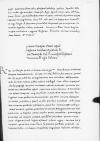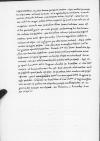Letter #6248
Ioannes DANTISCUS to Piotr TOMICKIPlymouth, 1522-11-10
Manuscript sources:
Auxiliary sources:
| ||||||||||
Text & apparatus & commentary Plain text Text & commentary Text & apparatus Excerpts concerning Dantiscus' travels
Reverendissime in Christo Pater et Domine, domine gratiosissime. Humillimam servitiorum meorum commendationem.
Scripsi Dominationi Vestrae Reverendissimae in his annexis, cf.  BJ 6557, f. 45v neque permittitur, ut extra domum quicquam ematur, et pro multis pecuniis hic misere vivo in horas metuens, ne in aegritudinem inciderem, nam aliquoties stomachi dolorem cum torsione colica hic sensi. Inter haec omnia nihil me magis sedulo dolore conficit, quam quod aura mihi sic adversatur, quando vero secundam illam sumus habituri, nemo est de his, qui intelligunt, qui certo sperent; audiunturque hic tam horrendae crebrius tempestates, quae non solum arbores, sed montes possent evertere. Quas modo essent pro nobis, libenter ingrederer, saltem ne viderer vel deses vel negligens, qui ultro moras necteret. cf. Verg. A. 5 26-27 tum pius Aeneas: equidem sic poscere ventos iamdudum et frustra cerno te tendere contra ⌊Atqui contra ventos navigare possumcf. Verg. A. 5 26-27 tum pius Aeneas: equidem sic poscere ventos iamdudum et frustra cerno te tendere contra ⌋?
Cum illos Deus in manibus habeat, cuius in hoc gratiam oportet praestolari. Proinde Dominationi Vestrae Reverendissimae humiliter supplico, non ducatur suspicione, quod forsan volens profectionem meam deferrem ms. differrem(!)
⌈deferremdeferrem ms. differrem(!)
⌉, vel quod ignavia vel metus aliquis me retraheret. Deo me commisi, cum
quo nihil formidandum penitus mihi persuasi. Agat itaque apud sacratissimam
BJ 6557, f. 45v neque permittitur, ut extra domum quicquam ematur, et pro multis pecuniis hic misere vivo in horas metuens, ne in aegritudinem inciderem, nam aliquoties stomachi dolorem cum torsione colica hic sensi. Inter haec omnia nihil me magis sedulo dolore conficit, quam quod aura mihi sic adversatur, quando vero secundam illam sumus habituri, nemo est de his, qui intelligunt, qui certo sperent; audiunturque hic tam horrendae crebrius tempestates, quae non solum arbores, sed montes possent evertere. Quas modo essent pro nobis, libenter ingrederer, saltem ne viderer vel deses vel negligens, qui ultro moras necteret. cf. Verg. A. 5 26-27 tum pius Aeneas: equidem sic poscere ventos iamdudum et frustra cerno te tendere contra ⌊Atqui contra ventos navigare possumcf. Verg. A. 5 26-27 tum pius Aeneas: equidem sic poscere ventos iamdudum et frustra cerno te tendere contra ⌋?
Cum illos Deus in manibus habeat, cuius in hoc gratiam oportet praestolari. Proinde Dominationi Vestrae Reverendissimae humiliter supplico, non ducatur suspicione, quod forsan volens profectionem meam deferrem ms. differrem(!)
⌈deferremdeferrem ms. differrem(!)
⌉, vel quod ignavia vel metus aliquis me retraheret. Deo me commisi, cum
quo nihil formidandum penitus mihi persuasi. Agat itaque apud sacratissimam
Ex

